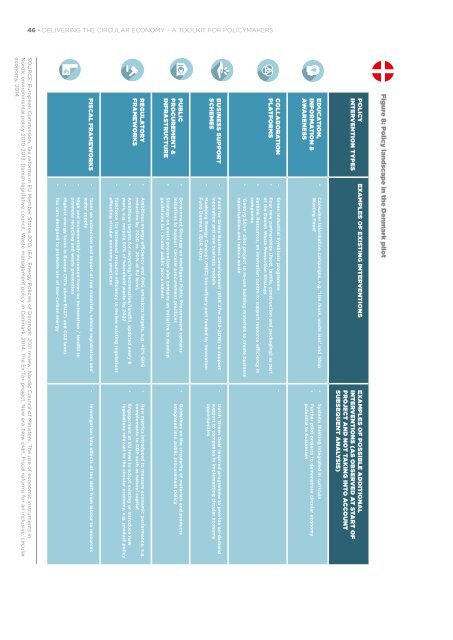DELIVERING THE CIRCULAR ECONOMY A TOOLKIT FOR POLICYMAKERS
20150924_Policymakers-Toolkit_Active-links
20150924_Policymakers-Toolkit_Active-links
Create successful ePaper yourself
Turn your PDF publications into a flip-book with our unique Google optimized e-Paper software.
46 • <strong>DELIVERING</strong> <strong>THE</strong> <strong>CIRCULAR</strong> <strong>ECONOMY</strong> – A <strong>TOOLKIT</strong> <strong>FOR</strong> <strong>POLICYMAKERS</strong><br />
Figure 8: Policy landscape in the Denmark pilot<br />
POLICY<br />
INTERVENTION TYPES<br />
EXAMPLES OF EXISTING INTERVENTIONS EXAMPLES OF POSSIBLE ADDITIONAL<br />
INTERVENTIONS (AS OBSERVED AT START OF<br />
PROJECT AND NOT TAKING INTO ACCOUNT<br />
SUBSEQUENT ANALYSIS)<br />
EDUCATION,<br />
IN<strong>FOR</strong>MATION &<br />
AWARENESS<br />
• Consumer information campaigns, e.g. ‘Use more, waste less’ and ‘Stop<br />
Wasting Food’<br />
• Systems thinking integrated in curricula<br />
• Further pilot projects to demonstrate circular economy<br />
potential to businesses<br />
COLLABORATION<br />
PLAT<strong>FOR</strong>MS<br />
• Green Industrial Symbiosis programme<br />
• Four new partnerships (food, textile, construction and packaging) as part<br />
of the Danish Waste Prevention Strategy<br />
• Rethink Resources, an innovation centre to support resource efficiency in<br />
companies<br />
• ‘Genbyg Skive’ pilot project to re-use building materials to create business<br />
opportunities and reduce waste<br />
-<br />
BUSINESS SUPPORT<br />
SCHEMES<br />
• Fund for Green Business Development (EUR 27m 2013–2018) to support<br />
innovation and new business models<br />
• Maabjerg Energy Concept (MEC) bio-refinery part funded by Innovation<br />
Fund Denmark (EUR 40m)<br />
• Dutch ‘Green Deal’ inspired programme to provide on-demand<br />
support to companies in implementing circular economy<br />
opportunities<br />
PUBLIC<br />
PROCUREMENT &<br />
INFRASTRUCTURE<br />
• Government Strategy on Intelligent Public Procurement contains<br />
initiatives to support circular procurement practices<br />
• Strategy on waste prevention also contains an initiative to develop<br />
guidelines for circular public procurement<br />
• Guidelines on the circularity of materials and products<br />
integrated into public procurement policy<br />
REGULATORY<br />
FRAMEWORKS<br />
• Ambitious energy efficiency and GHG emissions targets, e.g. 40% GHG<br />
reduction by 2020 vs. 20% at EU level,<br />
• Ambitious targets for recycling/incineration/landfill, updated every 6<br />
years, e.g. recycle 50% of household waste by 2022<br />
• Taskforce for increased resource efficiency to review existing regulations<br />
affecting circular economy practices<br />
• New metrics introduced to measure economic performance, e.g.<br />
complements to GDP such as natural capital<br />
• Engagement at EU level to adapt existing or introduce new<br />
regulations relevant to the circular economy, e.g. product policy<br />
FISCAL FRAMEWORKS • Taxes on extraction and import of raw materials, vehicle registration and<br />
water supply<br />
• High and incrementally increased taxes on incineration / landfill to<br />
promote recycling and waste prevention<br />
• Highest energy taxes in Europe (70% above EU27) and CO2 taxes<br />
• Tax cuts designed to promote use of low-carbon energy<br />
• Investigation into effects of tax shift from labour to resources<br />
SOURCE: European Commission, Tax reforms in EU Member States 2013; IEA, Energy Policies of Denmark: 2011 review; Nordic Council of Ministers, The use of economic instruments in<br />
Nordic environmental policy 2010-2013; Danish legislative council, Waste management policy in Denmark, 2014; The Ex’Tax project, New era. New plan. Fiscal reforms for an inclusive, circular<br />
economy, 2014.



